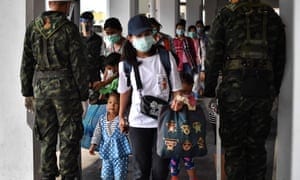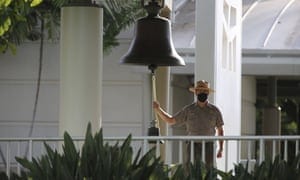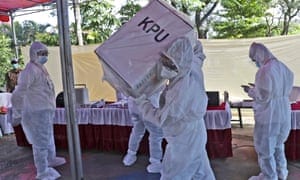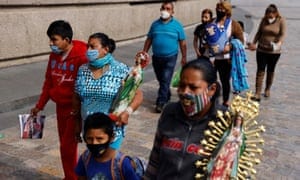Thailand to increase border patrol following new case cluster
Thailand will deploy drones and increase military patrols along its border with Myanmar following a small cluster of cases linked to people crossing undetected into the country.
At least 19 cases of the coronavirus have been linked to people passing over the border without undergoing mandatory quarantine. Health workers have raced to trace hundreds of contacts, while some schools have also been closed as a precaution.
Thailand – which has recorded 4,126 cases and 60 deaths – has been praised by the World Health Organisation for its success in handling the outbreak, including its contact tracing efforts and strict lockdown earlier in the year.

The country has been mostly shut to foreign tourists since March but it shares a porous, 1,500 mile border with neighbouring Myanmar – which has struggled to control virus cases.
The border, which stretches through dense forest and mountainous terrain, is difficult to monitor and there is concern that migrant workers who may have crossed the border illegally will be afraid to seek help if they do develop symptoms.
Prime minister Prayuth Chan-ocha has said border surveillance will be increased and called for calm, saying that the country is not facing a second wave.
Separately, four local cases were detected among medical staff working in quarantine facilities and a private hospital.
In the UK, for many years the word “destitution” felt like a throwback to some dimly lit Victorian past. No one was destitute in modern Britain, at least those who were eligible for social security. You might be poor, but it was rare to be regularly hungry, cold, ill-clothed, and entirely dependent on the kindness of charity.
All that started to change less than a decade ago. While headline relative poverty rates seemed to change very little, researchers noticed that the proportion of those below the breadline experiencing extreme poverty was growing. Food bank volunteers saw people going for days without eating. Debt charities helped people mired in mountains of debt over unpaid rent and utility bills.
Three years ago the veteran anti-poverty campaigner and former MP Frank Field suggested what was being witnessed day in day out in the food banks and church halls of the UK’s poorest neighbourhoods went far beyond the quotidian shock of poverty numbers. Destitution was real and growing alarmingly, he said. “Clearly something unique and horrendous is happening to the bottom end of our society.”
A passenger on board a “cruise-to-nowhere” from Singapore has tested positive for Covid-19, the operator Royal Caribbean said on Wednesday.
Singapore has been trialling the trips which are open only to the city-state’s residents, make no stops and sail in waters close by. At 2.45 am on Wednesday morning, the captain of the Quantum of the Seas informed the 2,000 passengers that the ship was to return to dock a day early and that they should stay in their rooms, the Straits Times reports.
At 8.10 the captain confirmed that a passenger had tested positive. Breakfast would be served to passengers in their rooms, he said.
“It’s important that you know that you are safe on board and we have a good plan in place to maintain your health, safety and comfort.”
Destitution levels in Great Britain are expected to double in the wake of the pandemic with an estimated 2 million families, including a million children, likely to struggle to afford to feed themselves, stay warm, or keep clean as the recession deepens, according to a study.
The estimates, carried out for the Joseph Rowntree Foundation (JRF), described “increasing, intensifying” levels of extreme poverty experienced by some of the country’s poorest households in recent years, and highlight a social security system increasingly failing to protect society’s most vulnerable:
The British government has been urged to launch a one-off wealth tax on millionaire households to raise up to £260bn in response to the coronavirus pandemic, as the crisis damages Britain’s public finances and exacerbates inequality.
The Wealth Tax Commission – a group of leading tax experts and economists brought together by the London School of Economics and Warwick University to examine the case for a levy on assets – said targeting the richest in society would be the fairest and most efficient way to raise taxes in response to the pandemic.
In a highly anticipated report, the group, which has drawn attention from the Commons Treasury committee and the former head of the civil service, Sir Gus O’Donnell, said its proposals would be preferable to a broad-based tax raid on workers’ incomes and consumer spending:






























